Top 10 Epidemiology Certifications 2025
Explore the top epidemiology certifications for 2025, offering flexible options to enhance your public health career and skills.
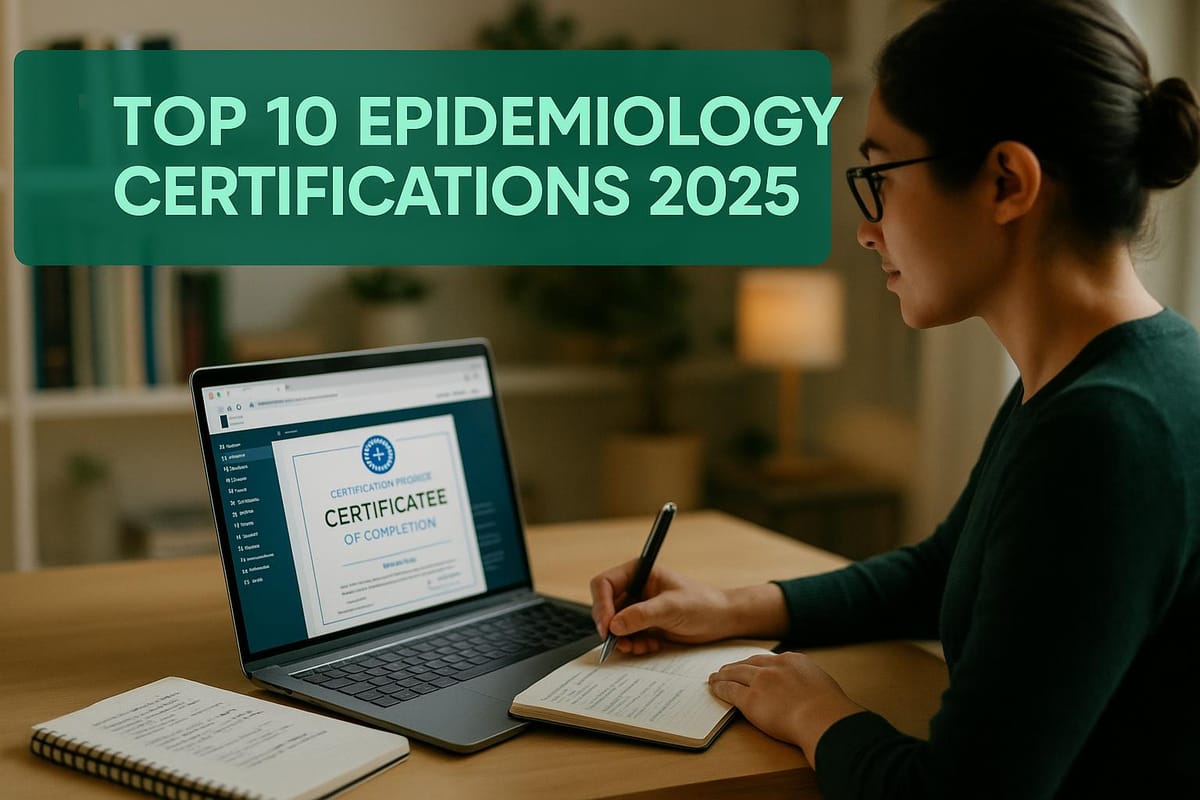
Earning an epidemiology certification in 2025 can boost your public health career by equipping you with skills in disease tracking, research methods, and population health analysis. This article highlights the top 10 certifications to consider, offering both online and hybrid options to fit various schedules and budgets. Whether you’re a beginner or an experienced professional, these programs cater to diverse career goals. Here's a quick overview:
- Johns Hopkins University: Focus on disease surveillance and outbreak investigation via Coursera.
- UNC Chapel Hill: Introductory epidemiology concepts on Coursera.
- Capella University: Graduate-level public health certificate with an epidemiology focus.
- Harvard T.H. Chan School: Clinical research with an epidemiology track.
- UC Berkeley: Certificate in Epidemiology and Biostatistics with flexible formats.
- University of Michigan: Epidemiology certification for health professionals.
- NBPHE – CDI: Certification in Disease Intervention for public health roles.
- Imperial College London: Study designs in epidemiology via Coursera.
- Utrecht University: Clinical epidemiology course with practical applications.
- University of the People: Tuition-free certificate in epidemiology.
Quick Comparison
| Program | Format | Duration | Cost | Ideal For |
|---|---|---|---|---|
| Johns Hopkins (Coursera) | Online | 1-3 months | $49-$99/month | Beginners, flexible learning |
| UNC Chapel Hill (Coursera) | Online | 1-3 months | $49-$99/month | Beginners, short-term commitment |
| Capella University | Online/Hybrid | 6-12 months | $2,000-$4,000 | Advanced learners, career-focused |
| Harvard T.H. Chan | Hybrid/In-person | 6-12 months | $3,000-$6,000 | Professionals seeking advanced roles |
| UC Berkeley | Hybrid/Online | 6-12 months | $2,500-$5,000 | Working professionals, career changers |
| University of Michigan | Online/Hybrid | 6-12 months | $2,000-$4,500 | Health professionals |
| NBPHE – CDI | Online exam prep | 2-6 months prep | $500-$1,000 | Public health specialists |
| Imperial College (Coursera) | Online | 1-3 months | $49-$99/month | Research-focused learners |
| Utrecht University (Coursera) | Online | 1-3 months | $49-$99/month | Clinical research professionals |
| University of the People | Online | 6-12 months | Free | Budget-conscious learners, entry-level |
Choose the program that aligns with your career goals, budget, and schedule. After certification, platforms like Scale.jobs can further assist with job applications, resume optimization, and career guidance tailored to public health professionals.
UD's Graduate Certificate in Epidemiology
1. Johns Hopkins University – Epidemiology in Public Health Practice Certificate (Coursera)
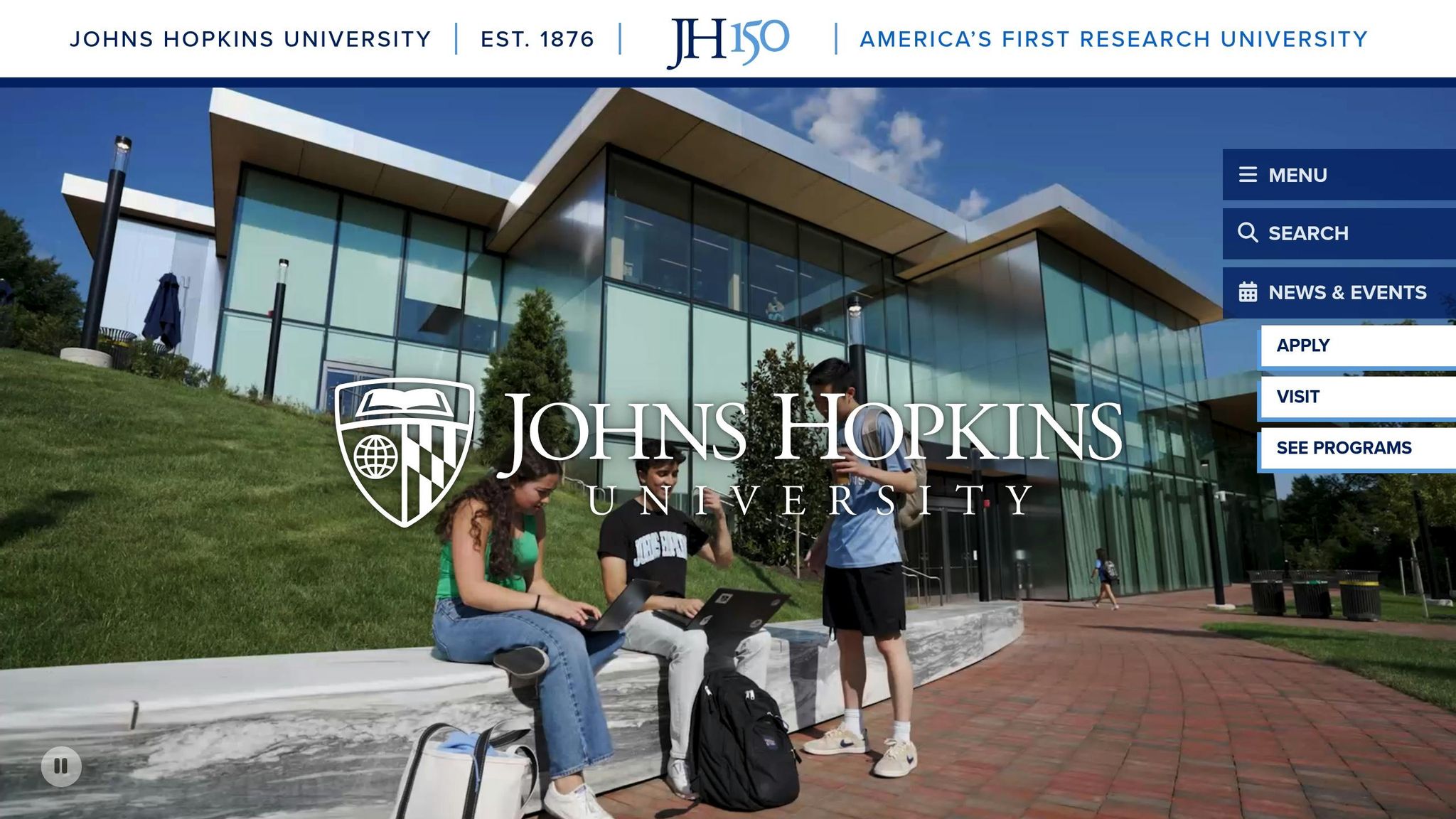
Johns Hopkins University offers a certification program designed to build essential skills in epidemiology, including disease surveillance, outbreak investigation, and assessing population health. The curriculum is structured to provide practical, hands-on learning that equips students to tackle real-world public health challenges effectively.
Program Reputation and Accreditation
Johns Hopkins is widely regarded for its rigorous academic standards and expertise in public health. Its strong reputation in epidemiology adds significant value to this certification, making it highly respected among employers. The program is taught by seasoned faculty members who bring extensive field experience, offering students practical insights into addressing current public health issues.
Flexible Online Delivery
Hosted on Coursera, this self-paced course allows students to engage with interactive case studies, peer discussions, and data analysis projects. The flexible format is designed to accommodate learners from diverse backgrounds, making it accessible to a broad audience.
Admissions and Accessibility
This program is open to a wide range of applicants, with no prior epidemiology experience required. While many participants hold a bachelor’s degree, individuals from various academic and professional backgrounds can benefit. The curriculum also emphasizes U.S. public health systems, preparing graduates for roles within domestic healthcare settings.
Career Impact and Industry Recognition
Earning this certification can serve as a powerful stepping stone for advancing in the public health field. The strong reputation of Johns Hopkins helps graduates stand out in a competitive job market, showcasing their mastery of core epidemiological skills. For those looking to maximize their career potential, tools like Scale.jobs can provide additional support:
- Personalized assistance from human experts to refine applications.
- ATS-optimized resumes designed to enhance visibility to recruiters.
- Reverse recruiting services with clear, one-time payment options.
After completing the certification, leveraging services like Scale.jobs can help you effectively highlight your expertise and secure opportunities. This highly regarded program sets a strong foundation as we continue to explore more pathways for advancing careers in epidemiology in 2025.
2. University of North Carolina at Chapel Hill – Epidemiology: The Basic Science of Public Health (Coursera)
The University of North Carolina at Chapel Hill offers an online course on Coursera titled Epidemiology: The Basic Science of Public Health. This program introduces the core concepts of epidemiology and how they apply to public health practice. For more details, visit the course page on Coursera.
This course provides a comprehensive introduction to essential epidemiological principles. Its flexible online structure includes video lectures, interactive assignments, and community forums, making it convenient for learners to engage with the material at their own pace. By completing this course, you'll gain a strong foundation in epidemiology, which can help you explore new career opportunities in the field.
Earning this certification can enhance your qualifications for roles in public health and epidemiology. However, it’s always a good idea to evaluate how this course aligns with your professional goals and industry requirements before enrolling.
To further support your career growth, consider using Scale.jobs, a platform designed to streamline your job search. Here's what makes Scale.jobs a valuable resource:
- Personalized Application Support: Get expert guidance tailored for roles in public health and government sectors.
- ATS-Optimized Resumes: Ensure your resume is formatted to meet applicant tracking system (ATS) standards, increasing your chances of being noticed by employers.
- Affordable, One-Time Payment: Access professional assistance without worrying about ongoing subscription fees.
Scale.jobs combines cutting-edge tools with human expertise to help you connect your new certification to meaningful career opportunities in public health.
3. Capella University – Graduate Certificate in Public Health (with Epidemiology focus)
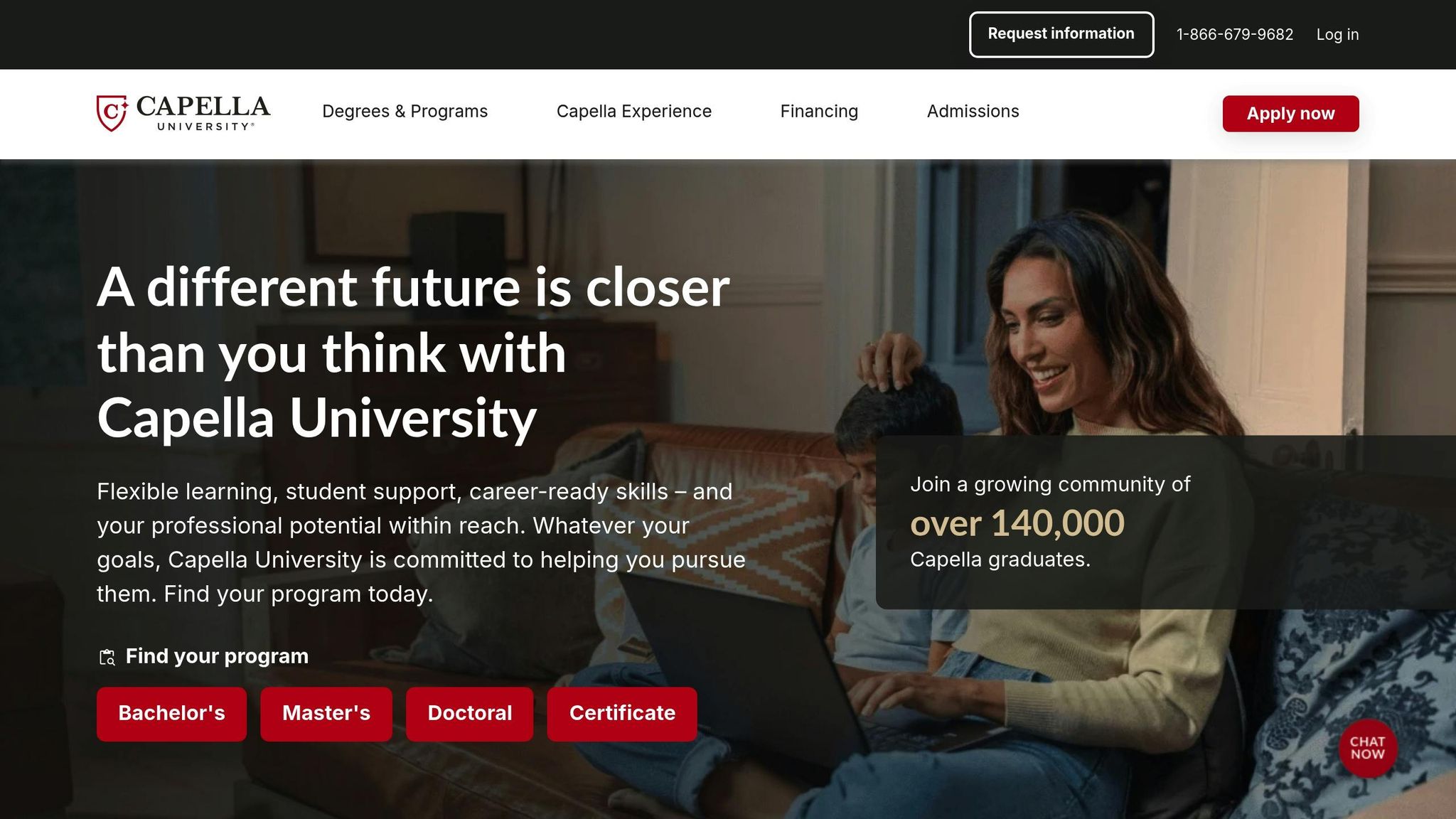
Capella University offers a Graduate Certificate in Public Health with a focus on epidemiology, making it a strong option for those looking to advance in this field. While specific details about the curriculum, program format, and admissions process are not provided here, you can find the most accurate and up-to-date information by visiting Capella University's official website. This certification could serve as a stepping stone toward higher-level roles in public health.
Once you've earned the certification, it's important to showcase your new qualifications effectively. Platforms like Scale.jobs can help you make the most of your achievements by providing services such as:
- Resume optimization specifically designed for public health careers.
- Personalized support with real-time updates via WhatsApp.
- Simple pricing with a clear, one-time payment and dedicated assistance.
Using these professional tools can help you turn your academic accomplishments into tangible career opportunities. Be sure to align the program details with your career goals to make the most of this certification in epidemiology.
4. Harvard T.H. Chan School of Public Health – Principles and Practice of Clinical Research (Epidemiology Track)
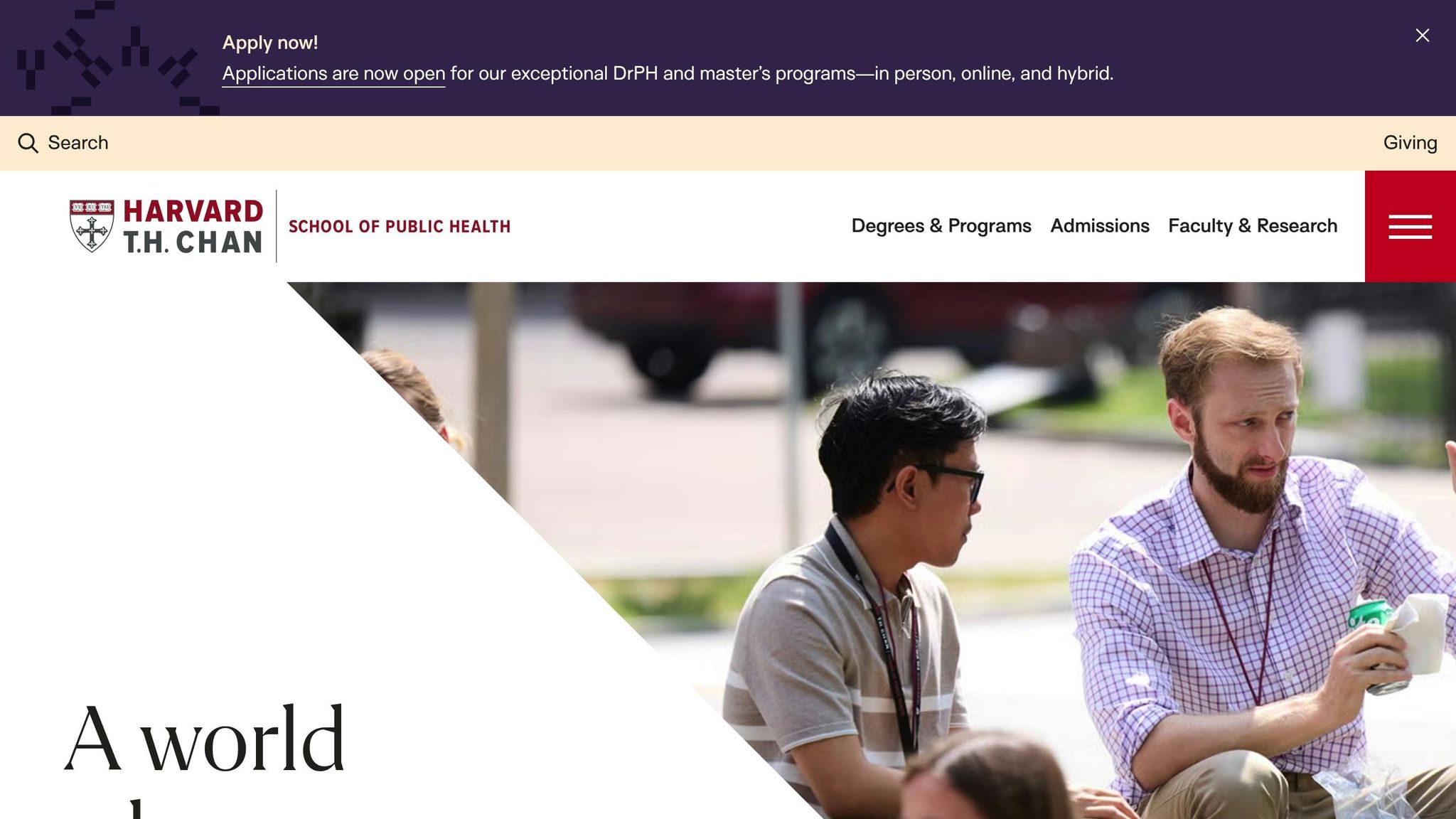
Program Accreditation and Reputation
The Harvard T.H. Chan School of Public Health is a leader in public health education, known for its high academic standards and dedication to improving global health. Accredited by CEPH, the school ensures its programs meet rigorous criteria. The Principles and Practice of Clinical Research program, particularly its epidemiology track, reflects this dedication. It’s designed to equip students with the expertise needed to tackle complex public health issues, aligning well with the certifications mentioned earlier.
Boosting Your Career Opportunities
Earning a certification from Harvard can significantly elevate your professional profile. This program stands out by combining clinical research with epidemiology, offering practical skills that are highly valued in the job market. For those looking to enhance their job applications, services like Scale.jobs provide ATS-friendly resumes, personalized application assistance, and straightforward, one-time payment options to help you take the next step in your career.
5. University of California, Berkeley – Certificate in Epidemiology and Biostatistics
Program Accreditation and School Reputation
The UC Berkeley School of Public Health has earned a strong reputation in the field of epidemiology, known for its cutting-edge research and high-quality education. Accredited by the Council on Education for Public Health (CEPH), this program is led by some of the top experts in epidemiology. Employers often view the Berkeley name as a symbol of analytical precision and academic rigor, giving graduates a competitive edge in the job market. The program’s robust academic framework equips students with the skills needed to excel in the ever-evolving field of public health.
Online or In-Person Delivery Options
UC Berkeley provides multiple learning formats to accommodate different schedules, including online, in-person, and hybrid options. These flexible delivery methods are especially beneficial for working professionals balancing their careers and personal commitments with further education. The certificate program typically takes 6–12 months to complete.
The online courses maintain the same level of academic intensity as their in-person counterparts. With asynchronous learning options, students can access lectures and course materials at their convenience. Evening classes and part-time enrollment further enhance accessibility, making it easier for full-time professionals to upskill without stepping away from their jobs.
Requirements and Access for U.S. Job Seekers
To apply, candidates need a bachelor’s degree, ideally in fields like health sciences or biology. While some background in statistics or biology is recommended, the program is designed to welcome students from a variety of academic disciplines.
U.S. citizens and permanent residents benefit from streamlined access to the program. It’s tailored to meet the needs of both recent graduates and working professionals, offering flexible scheduling and part-time options that allow students to continue working while pursuing their certification.
Career Impact and Industry Recognition
Graduates of this program gain hands-on expertise in areas such as epidemiologic methods, biostatistics, study design, data analysis, and public health applications. This practical training prepares them to make an immediate impact in the field. Alumni often land roles at prestigious organizations like the Centers for Disease Control and Prevention (CDC), state health departments, and leading healthcare systems.
The certificate opens doors to roles such as epidemiologist, data analyst, and research coordinator. Tuition costs range between $5,000 and $8,000, with financial aid and tuition reimbursement options available to help manage expenses.
For those entering the competitive public health job market, tools like Scale.jobs offer additional support by providing:
- ATS-optimized resume services to improve job application success
- Human-assisted application guidance with dedicated WhatsApp support
- A one-time payment structure without recurring subscription fees
Using platforms like Scale.jobs can help graduates effectively leverage their Berkeley certification to secure impactful roles in public health.
6. University of Michigan School of Public Health – Certificate in Epidemiology
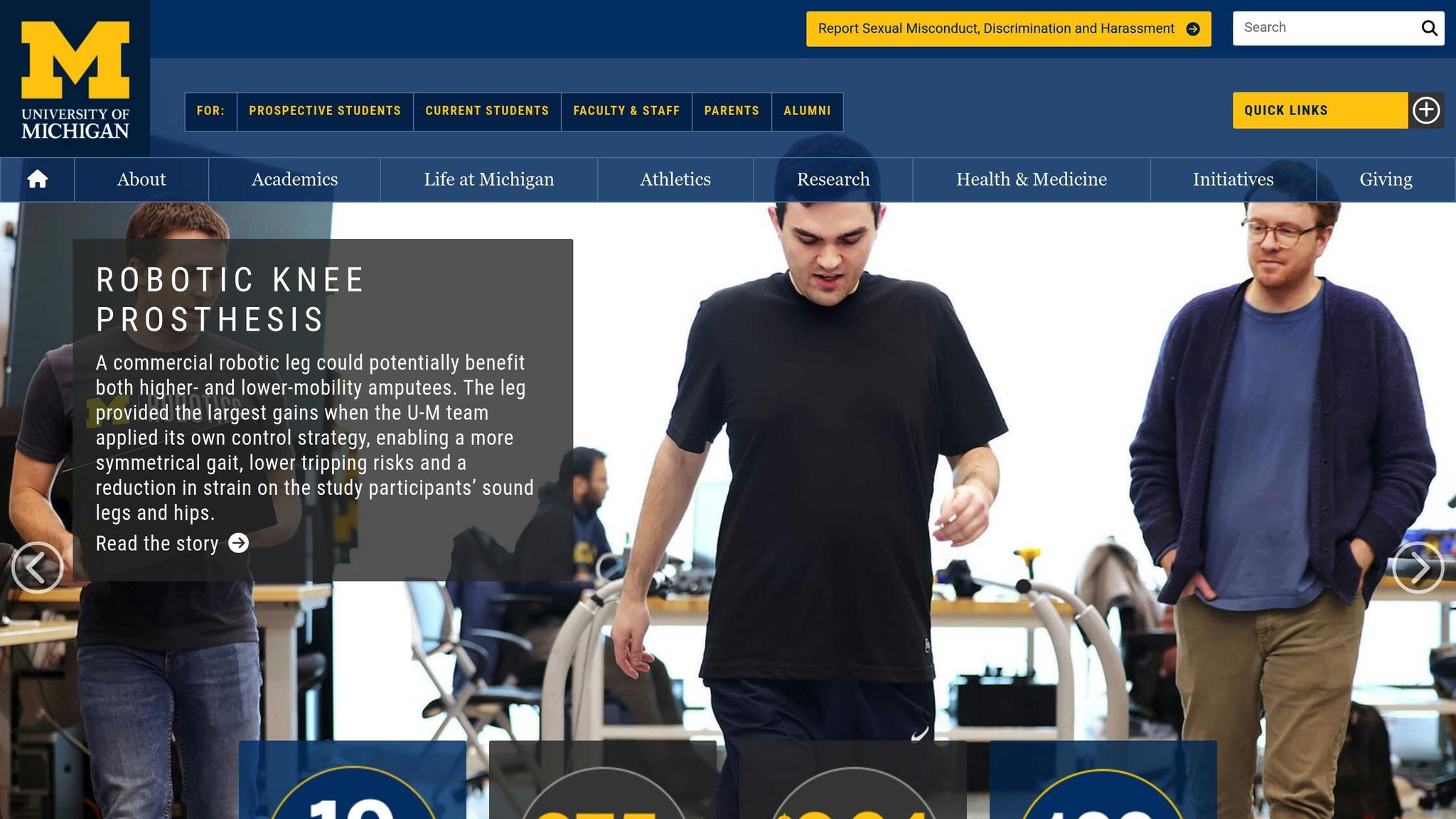
Details about the University of Michigan's Certificate in Epidemiology are somewhat limited, so it's a good idea to check the official website for the most accurate and up-to-date information. What is clear, though, is that this certification can help open doors in the public health field, making it a valuable asset for professionals looking to advance their careers.
Since specific program details aren't readily available, having strong job search support becomes even more essential. Pairing your certification with focused career strategies can make a big difference. Services like Scale.jobs can provide targeted help, including:
- Personalized, one-on-one guidance specifically designed for epidemiology professionals.
- Real-time updates via WhatsApp to keep you informed at every step.
- A straightforward, one-time payment option - no recurring fees to worry about.
- Transparent proof of work, including time-stamped screenshots of your progress.
Before applying, make sure to visit the University of Michigan's website to confirm all course details and ensure the program aligns with your career goals.
7. Certified in Disease Intervention (CDI) – National Board of Public Health Examiners (NBPHE)
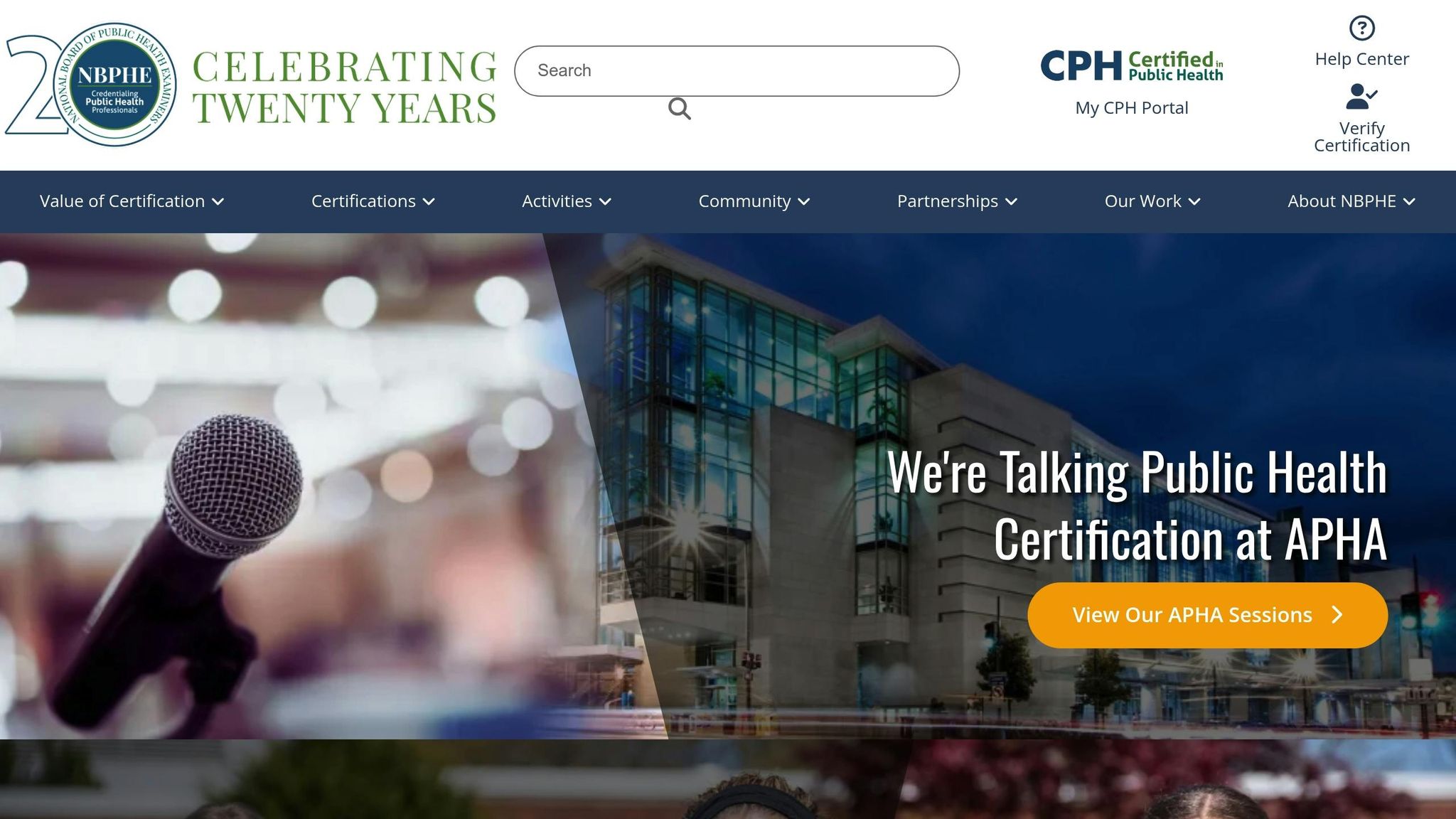
Finding detailed information about the Certified in Disease Intervention (CDI) credential from the National Board of Public Health Examiners (NBPHE) can be a challenge. Without clear program specifics, it’s tough for potential candidates to determine if this certification fits their career aspirations or provides the necessary support to advance in the field of epidemiology.
Requirements and Access for U.S. Job Seekers
Since the eligibility criteria and application process for the CDI certification are not well-documented, it's essential for interested U.S. job seekers to reach out directly to the National Board of Public Health Examiners (NBPHE). This is the best way to confirm details like educational requirements, work experience qualifications, and any continuing education expectations. The lack of clarity highlights the importance of having reliable resources to guide your career decisions.
For those navigating unclear certification processes, having access to effective career tools is crucial. Scale.jobs provides tailored support for public health professionals, including those exploring roles in disease intervention. Their approach offers personalized help to address the challenges of certifications with limited information.
Career Impact and Industry Recognition
The lack of clear industry recognition for the CDI certification makes it difficult to gauge its true value. In situations like this, having specialized support can make all the difference. Scale.jobs offers a range of tools to help, including real-time WhatsApp support, a one-time payment structure (no recurring fees), and a transparent process that includes time-stamped screenshots to track progress.
Before committing to a certification with limited available details, take the time to confirm its relevance to your career goals. Always verify the most current requirements and recognition status directly with the certifying body to ensure it aligns with your professional objectives.
8. Imperial College London – Study Designs in Epidemiology (Coursera)

Imperial College London's Study Designs in Epidemiology course, offered through Coursera, dives into essential research methods used in epidemiology. It explores how various study designs tackle pressing public health issues. By focusing on well-structured research approaches, this course lays a strong groundwork for public health practice, making it a valuable step for career growth.
Program Overview and Institutional Reputation
Imperial College London is widely recognized for its excellence in public health education. This course, led by experienced professionals, underscores the institution's dedication to advancing knowledge and practice in the field.
Online Delivery Options
This course is fully online, hosted on Coursera, and designed to accommodate busy schedules. With its self-paced format, learners can engage with interactive lectures, quizzes, and practical exercises at their convenience.
Requirements and Access for U.S. Job Seekers
There are no strict prerequisites to enroll, though a basic grasp of statistics and public health concepts can be helpful. The course is available through a monthly subscription, and financial aid is an option for those who qualify. Like other high-quality programs, this one offers flexible learning tailored to career advancement.
For professionals in epidemiology, presenting these new skills effectively in job applications is crucial. Tools like those offered by Scale.jobs (https://scale.jobs) can make a difference with features such as:
- ATS-friendly resume optimization
- Real-time updates via WhatsApp
- One-time reverse recruiter assistance
These resources can help turn your newly acquired skills into opportunities in the competitive public health job market.
9. Utrecht University – Clinical Epidemiology (Coursera)
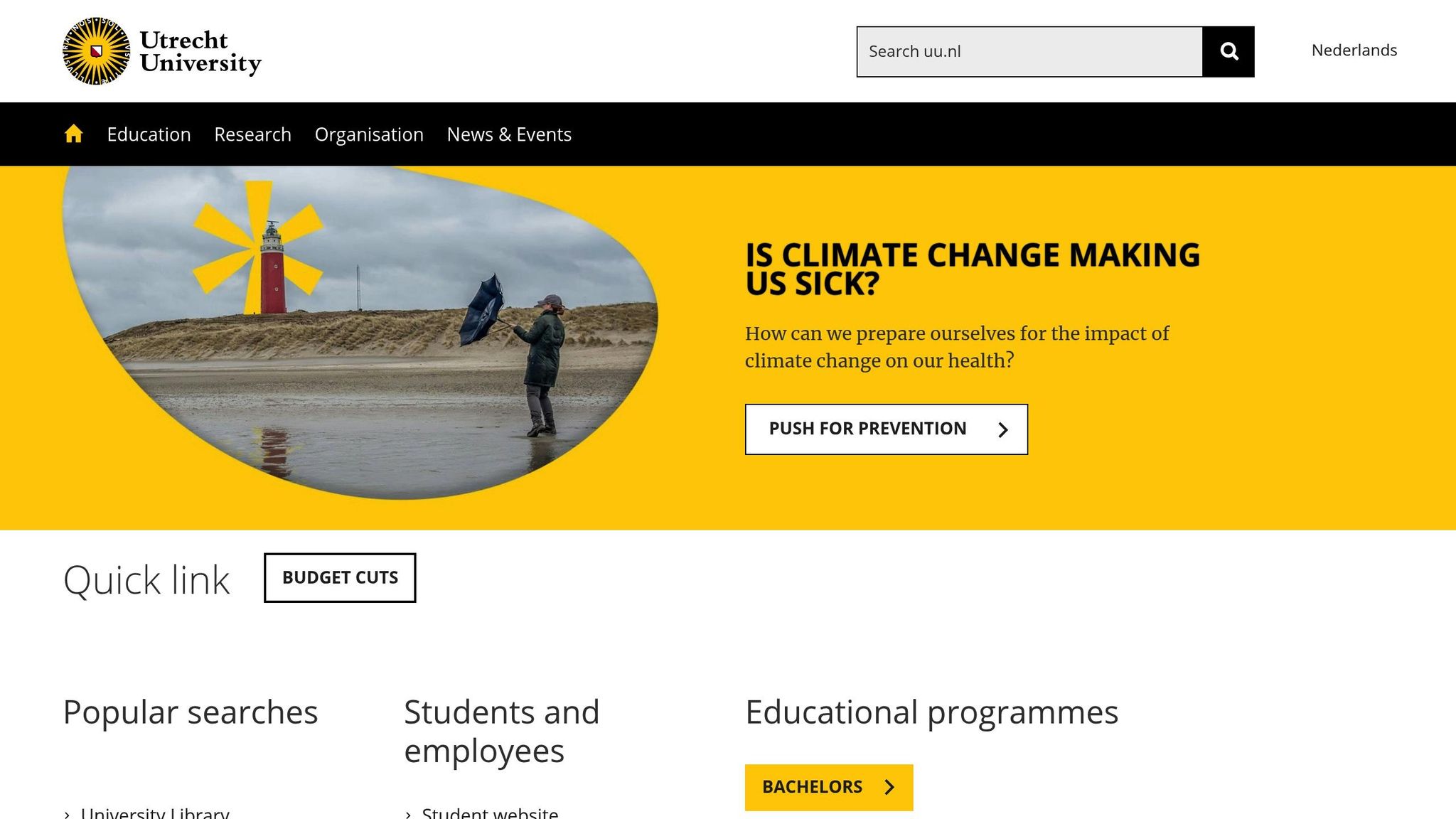
Utrecht University offers a Clinical Epidemiology course on Coursera, designed to deepen your understanding of evidence-based medicine. This intermediate-level program emphasizes key areas like diagnostic tests, clinical trials, patient evaluation, and risk analysis, sharpening analytical skills for clinical and research settings.
Program Accreditation and School Reputation
Utrecht University, a leading European research institution, brings its strong academic reputation to this course, boosting its credibility. The program has earned an impressive 4.7/5 rating from over 372 reviews on Coursera, reflecting its high-quality instruction and practical relevance.
While the Coursera certificate isn’t equivalent to a formal university degree or U.S. professional certification, it holds value due to Utrecht University's global standing in health sciences. Many employers and academic institutions recognize it as a credible form of continuing education, particularly for professionals aiming to enhance their expertise in clinical research methods.
Online Delivery Options and Requirements
This course is delivered in a flexible, self-paced format, featuring case studies and quizzes that encourage practical application. It requires a commitment of 3–5 hours per week over 1–3 months, making it manageable for busy professionals. A basic understanding of epidemiology and biostatistics is recommended for participants.
The course costs between $49 and $79, and financial aid is available through Coursera for eligible learners, including those in the U.S. This makes it accessible to a wide audience, from recent graduates to seasoned healthcare professionals seeking to expand their skill set.
Career Impact and Industry Recognition
The skills gained from the Clinical Epidemiology certificate are directly applicable to roles in public health agencies, research institutions, healthcare organizations, and pharmaceutical companies. Participants learn to design epidemiological studies, conduct clinical research, and analyze data - skills that are in high demand in today’s healthcare landscape.
Although this certificate is not a graduate degree or U.S. board certification, it demonstrates specialized training in clinical research methods. Graduates often report greater confidence in applying epidemiological principles, opening doors to roles like clinical research coordinator, epidemiology analyst, and public health consultant.
In addition to the technical knowledge, combining this certification with tools like Scale.jobs (https://scale.jobs) can give you an edge in the job market. Scale.jobs offers resources such as:
- ATS-optimized resumes tailored for epidemiology roles
- AI-driven application tools for clinical research positions
- A straightforward, one-time payment system with clear proof-of-work
This program not only enhances your expertise but also equips you with the tools to advance your career in evidence-based healthcare.
10. University of the People – Certificate in Epidemiology (Health Science Studies)

The University of the People provides a tuition-free Certificate in Epidemiology, designed to develop essential skills in understanding disease patterns and conducting public health research. As a tuition-free institution, it’s an appealing choice for those looking for affordable training in this field.
Program Accreditation and School Reputation
Accredited by the DEAC, the University of the People equips students with critical knowledge in areas like disease surveillance, outbreak investigation, and statistical analysis. The program’s strong foundation is complemented by its fully online format, making it accessible to students worldwide.
Online Delivery Options
The program is entirely online, allowing students to study at their own pace without disrupting their personal or professional commitments.
Career Impact and Industry Recognition
This certificate can open doors to entry-level roles in public health or serve as a stepping stone for further academic pursuits.
To enhance job prospects, students can take advantage of Scale.jobs, which offers tools like:
- ATS-friendly resume building
- AI-powered cover letter creation
- Personalized support from human assistants during the job application process
Side-by-Side Comparison
Selecting the right epidemiology certification can significantly impact your expertise and career prospects. To help you make an informed choice, here’s a detailed comparison of various programs, focusing on their structure, costs, and other essential factors. Check out the table below for a clear overview.
| Certification Program | Format | Duration | Prerequisites | Estimated Cost | Job Support Services |
|---|---|---|---|---|---|
| Johns Hopkins University – Epidemiology in Public Health Practice | Online (Coursera) | 1-3 months | None (health science background recommended) | $49-$99/month | Career guidance, resume review, networking opportunities |
| UNC Chapel Hill – Epidemiology: Basic Science of Public Health | Online (Coursera) | 1-3 months | None | $49-$99/month | Coursera career services, alumni network access |
| Capella University – Graduate Certificate in Public Health | Online/Hybrid | 6-12 months | Bachelor's degree required | $2,000-$4,000 | Career counseling, job placement assistance, alumni network |
| Harvard T.H. Chan – Clinical Research (Epidemiology Track) | Hybrid/In-person | 6-12 months | Graduate-level enrollment, prior coursework | $3,000-$6,000 | Extensive alumni network, career services, job board access |
| UC Berkeley – Certificate in Epidemiology and Biostatistics | Hybrid/In-person | 6-12 months | Relevant degree or experience | $2,500-$5,000 | Career counseling, networking events, job placement support |
| University of Michigan – Certificate in Epidemiology | Online/Hybrid | 6-12 months | Health-related background preferred | $2,000-$4,500 | Alumni network, career guidance, professional development |
| NBPHE – Certified in Disease Intervention (CDI) | Online exam prep | 2-6 months prep | Relevant degree and/or experience | $500-$1,000 | Professional recognition, continuing education resources |
| Imperial College London – Study Designs in Epidemiology | Online (Coursera) | 1-3 months | None | $49-$99/month | Coursera career services, international networking |
| Utrecht University – Clinical Epidemiology | Online (Coursera) | 1-3 months | Basic statistics knowledge helpful | $49-$99/month | Career guidance through Coursera platform |
| University of the People – Certificate in Epidemiology | Online | 6-12 months | None | Free (tuition-free) | Basic career guidance, online resources |
This table outlines the essential features of each program, helping you align your choice with your professional goals and personal circumstances.
Key Insights for Your Decision
- Cost: Options range from free (University of the People) to several thousand dollars for more advanced or hybrid programs.
- Format: Fully online programs offer flexibility, while hybrid or in-person formats provide networking opportunities and hands-on learning.
- Duration: Programs vary from short-term (1-3 months) to more in-depth options lasting 6-12 months.
- Financial Aid: Coursera offers financial aid for eligible learners, many universities provide scholarships, and University of the People is tuition-free.
- Career Stage: University programs with networking and alumni support are ideal for recent graduates, while experienced professionals may prefer concise, focused certificates.
- Job Support: While most programs include basic career services, consider supplementing them with tools like Scale.jobs for advanced job search assistance, including ATS optimization and personalized support.
Use these insights to evaluate which certification best aligns with your career goals, budget, and schedule.
Final Thoughts
Earning an epidemiology certification in 2025 can open up a wealth of opportunities in a field where public health expertise is increasingly sought after. This certification not only highlights your dedication to evidence-based practices but also positions you for roles in government agencies, healthcare systems, research institutions, and private consulting firms.
When choosing the right program, it’s important to match your selection with your career goals and current stage. For recent graduates or those transitioning into the field, programs like those at Harvard T.H. Chan or UC Berkeley offer comprehensive training along with valuable networking and alumni resources. If you’re a working professional aiming to expand your skill set, flexible online options might be a better fit, allowing you to balance studies with your job. Budget is another key factor - options range from free programs like University of the People to higher-cost certificates from top-tier universities. If affordability is a concern, many Coursera-based programs offer financial aid. Your personal learning style and location also matter - hybrid formats provide in-person networking opportunities, while fully online programs offer unmatched flexibility. For those considering global roles, international programs can bring additional insights and perspectives.
After earning your certification, a strategic approach to job hunting is crucial. Traditional application methods may not effectively highlight your specialized skills. Platforms like Scale.jobs can help bridge this gap by offering tailored career support. With services like human-powered application assistance, ATS-optimized resumes, and AI-driven applications that emphasize your epidemiology expertise, Scale.jobs simplifies the process. Their flat-fee model, real-time WhatsApp updates, and proof-of-work screenshots ensure transparency and efficiency.
FAQs
What should I consider when selecting the best epidemiology certification program?
When selecting an epidemiology certification program, there are a few important factors to weigh to ensure it matches your professional aspirations. Start by looking at the program’s reputation and accreditation. A well-recognized and accredited program can carry more weight in the field of epidemiology. Next, dive into the curriculum. Make sure it includes key areas like biostatistics, public health, and data analysis - skills that are fundamental to the profession. Also, check the eligibility requirements. Some programs may require specific educational backgrounds or work experience, so ensure you meet those prerequisites. Lastly, think about the bigger picture. Consider how earning the certification could improve your career opportunities or potentially boost your salary.
If you're planning to job hunt after getting certified, platforms like scale.jobs can make the process smoother. They offer tools like ATS-friendly resumes and personalized support for job applications, helping you stand out to potential employers.
How can Scale.jobs help me find a job after earning an epidemiology certification?
Scale.jobs simplifies your job search after earning an epidemiology certification with a range of free tools. These include a job application tracker, a job board, networking features, and an ATS-compliant resume builder. Together, these tools help you stay on top of your applications while creating polished, professional materials.
If you're looking for more hands-on support, Scale.jobs also provides human-assisted services. Their trained virtual assistants and reverse recruiters take care of everything - from writing tailored resumes and cover letters to submitting applications on your behalf. With a clear, one-time payment structure and real-time updates, Scale.jobs saves you time and helps you stay focused on landing your next role.
Are there financial aid options available for Coursera's epidemiology certification programs?
Yes, Coursera provides financial aid for numerous certification programs, including those focused on epidemiology. To apply, you’ll need to complete a brief application outlining your financial circumstances and explaining how the course could help advance your career. If your application is approved, you can access the course materials either for free or at a reduced cost. For more information, check out the financial aid section on Coursera’s website.




